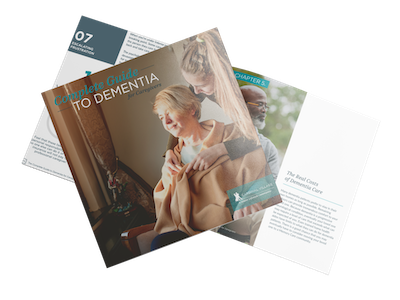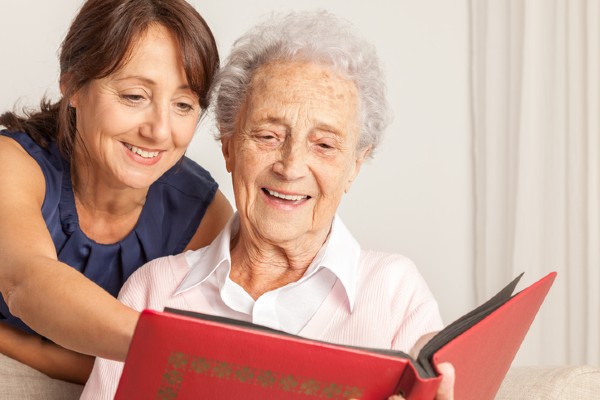Dementia is a general term indicating difficulty in the ability to think, remember or make decisions, all of which interfere with everyday activities. The World Health Organization defines dementia as a deterioration in cognitive function beyond what can be expected from biological aging.
The WHO says dementia can be caused by diseases or other injuries, such as Alzheimer’s disease or stroke. The numbers are hard to pin down, but the U.S. Centers for Disease Control and Prevention says about 5.8 million Americans have dementia.
>> Learn more about Memory Care at Senior Lifestyle
Find out how many different types of dementia there are, what symptoms to look for, how it’s diagnosed and how it’s treated.
The 4 Main Types of Dementia
Here are the 4 main types of dementia, as defined by the National Institutes of Health.
Alzheimer’s Disease
Alzheimer’s is the most common form of dementia, accounting for 60-70% of all cases, according to the WHO. It is believed to be caused by abnormalities of the brain. Proteins, called amyloid plaques, are deposited on the surface of the brain. Other proteins, called tau, are deposited inside the brain’s neurons, causing what are called tau tangles. These plaques and tangles are thought to damage healthy neurons and the fibers connecting them.
Symptoms of Alzheimer’s disease can vary. Here are several levels of the disease and the typical symptoms:
Mild
- Repeating questions
- Wandering and getting lost
Moderate
- Impulsive behavior
- Problems recognizing friends and family
Severe
- Inability to communicate
>> Read “Detecting Alzheimer’s Symptoms & Stages”
The typical age of diagnosis for Alzheimer’s disease is in the mid-60s and above. Some cases can start as young as the mid-30s.
Frontotemporal Dementia
Frontotemporal dementia occurs in the front of the brain as nerve cells and their connections break down. Abnormal amounts of proteins called tau and TDP-43 collect inside neurons in the frontal and temporal lobes at the front of the head.
Several types of symptoms can occur with frontotemporal dementia, mostly affecting behavior and personality. These are typical symptoms:
Behavioral and Emotional
- Difficulty organizing and planning
- Emotional flatness or excessive emotions
- Impulsive behaviors
Language
- Difficulty speaking or understanding speech
Movement
- Problems with balance and walking
- Trembling hands
The typical age of diagnosis for frontotemporal dementia is between 45 and 64.
Lewy Body Dementia
A different protein, alpha-synuclein, interferes with the transmission of chemical signals in the brain. These balloon-like clumps are called Lewy bodies.
Symptoms of Lewy body dementia can include:
Cognitive Decline
- Disorganized or illogical ideas
- Inability to concentrate, pay attention or stay alert
Hallucinations
- Acting out dreams during sleep
- Experiencing touch, sound or smell hallucinations
- Seeing shapes, animals or people that aren’t there
Movement Problems
- Loss of coordination
- Muscle rigidity
- Reduction of facial expressions
Sleep Disorders
- Excessive daytime sleepiness
- Insomnia
Lewy Body dementia is typically diagnosed in people ages 50 and older.
>> Read “Lewy Body Disease: What Is It, and What Are the Symptoms?“
Vascular Dementia
Vascular dementia is believed to account for 20% to 30% of all dementias, making it the second most common cause. Damage to blood vessels leading to the brain causes vascular dementia. This damage, caused by blood clots or other injuries, may cause strokes or otherwise damage the white matter in the brain.
Symptoms of vascular dementia are similar to those of other dementias:
- DIfficulties with problem solving
- Forgetting current or past events
- Hallucinations or delusions
- Loss of focus and organization
- Misplacing items
- Poor judgment
- Slowed thinking
- Trouble following instructions or learning new information
Vascular dementia is typically diagnosed in those over age 65.
>> Read “What to Know About Vascular Dementia“
How Dementia is Diagnosed
Most people with dementia have not been diagnosed. According to Alzheimer’s Disease International, only 20% to 50% of those with dementia have been diagnosed and are being treated.
Diagnosis can be impaired by the fact that some cognitive issues unrelated to dementia are common among seniors. Also, the 4 main types of dementia can share some similar symptoms. Some people also may have more than one kind of dementia.
Doctors may ask for a medical history, may conduct a complete physical examination, and may order laboratory and neurological tests to make or confirm a diagnosis of dementia.
How Dementia is Treated
Currently, there are no cures for these types of dementia. The WHO advises that the principal goals for those caring for dementia patients should be:
- Diagnosing early in order to promote early and optimal management
- Identifying and treating accompanying physical illness
- Optimizing activity, cognition, physical health and well-being
- Providing information and long-term support to caregivers
- Understanding and managing behavior changes.
Some treatments to stem or slow symptoms are available. There are a few ways dementia patients are provided for, according to the Mayo Clinic: medication and therapy, along with support.
Medication
These medications are used to temporarily improve symptoms for those with dementia:
- Cholinesterase inhibitors – These medicines boost levels of body chemicals involved in judgment and memory.
- Memantine – This medication regulates the activity of a different chemical that is involved in brain functions such as learning and memory. It often is prescribed along with cholinerase inhibitors.
- Other medicines – Doctors may prescribe other medications to treat agitation, depression, hallucinations, parkinsonism or sleep disturbances.
Therapies
Non-drug approaches for some dementia symptoms may include:
- Environment modification – Those with dementia may be helped by having clutter and noise reduced, helping them focus. Some objects such as knives and other sharp objects may have to be hidden or taken away. Car keys should be taken, also. Monitoring systems can be used to alert caregivers of any events such as falls or wandering.
- Occupational therapy – Therapists can show how to make a home safer and can teach coping behaviors. Their focus is to prevent accidents, manage behavior and prepare for the progression of dementia.
- Task simplification – Structure and routine can help reduce confusion in those with dementia. Tasks should be broken down into easier steps, with focus on success instead of failure.
Support
There are a range of agencies and services for people with dementia and those caring for them. Among these are:
Alzheimer’s Association – This organization offers a telephone helpline, connection to local resources, education and support programs, and more.
Alzheimers.gov – This government agency offers connections to federal resources and more information.
Family Caregiver Alliance – This group helps support caregivers and the people they care for.
>> Read “50 Essential Dementia Resources”
Find Safety and Security at Senior Lifestyle Communities
Discover how Senior Lifestyle communities can help and comfort those with various types of cognition challenges. Our Memory Care strives to give residents, no matter their current abilities or cognition, happier and more active days. These communities are designed with residents’ comfort and security in mind.
Learn more about our Memory Care program, find out more about Senior Lifestyle or schedule a tour today.

Download The Complete Guide to Dementia for Caregivers
Taking care of a loved one with dementia can be more than challenging. Read our eBook, “The Complete Guide to Dementia for Caregivers” which offers everything you need to know about caring for your loved one.
Download the Guide
